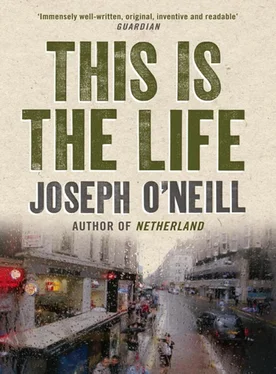Boag put three matters to me. The first matter was the complaints the firm had received from various clients — some of whom had long-standing connections with the firm — who alleged that I had neglected their cases. He read out the clients involved and the gist of their allegations (these complaints, I realized, related to the work I should have been doing when I was writing about Donovan). The second matter was the Lexden-Page incident. Tugging hard at his ear, the senior partner described the incident as he understood it. It was to be noted, Boag mumbled, that Lexden-Page had taken the matter to the Law Society, and they were demanding an explanation from us. Then he moved on to item three, my abrupt departure from work eleven days ago. Boag coughed delicately and asked me whether I agreed with the facts as he had stated them. I said I did. Then he coughed again and said that this was a most regrettable matter. Only once in his forty-two years at the firm did he recall a meeting of this nature. Unfortunately, the conduct in question was on its face so serious as to require immediate investigation and, if necessary, action of a disciplinary nature. In considering what action to take, the partners were keeping all options open. Did I understand the gravity of my situation?
I did, I said. Then I put my side of the story to the partners. I explained to them how my brother Charlie had been seriously ill with intestinal cancer, and how my inability to concentrate on my work came as a result of my worry for him. The perpetual hospital visits, the operations, the chemotherapy … (Here I asked the meeting to forgive me for a moment and paused to gather myself. I took a deep breath and continued.) The incident with Mr Lexden-Page, I said. Yes, that was truly unforgivable. All I could say about that was that I had received the news that morning that my brother had slipped into a coma. That said, there was no excuse for the way that I had spoken to Mr Lexden-Page. My departure from work was to visit Charlie. (I coughed before continuing.) I could reassure those present that I would not be seeing Charlie on the firm’s time any more. Charlie was dead, I said. Three days ago he had passed away.
I cleared my throat and stole a look up the table to see how the story had gone down. Pretty well, it seemed. No one was moving a muscle.
After a profound silence punctuated by the sounds of pens dropping, Edward Boag spoke up. To my surprise, he seemed irritated. ‘Yes, thank you, Jones. It’s a pity we didn’t hear all of this a bit earlier, though, isn’t it? Never mind,’ he said, not waiting for a reply, ‘it can’t be helped now.’ He picked at his ear. ‘Thank you, Jones, you can go now unless anybody has any questions.’
I went back to my office. Half an hour later I received notification from the partners that in view of my bereavement I should have some days off. A final decision about what action, if any, they would take would be made on my return.
I did not react to the news of my reprieve. I did not move from my chair. My body felt heavy, as though it had been leaded down for some underwater journey. I weighed a ton.
Then I thought: this time off that I had been given — what if it was to give the firm time to check up on my story? Any private eye worth his salt would find out inside a couple of hours that I had told a pack of lies, that my brother Charlie was as fit as a fiddle, working in a bank in Chester.
Of course they would check up on my story. They were not stupid.
I forced myself to my feet. An idea, a long shot, had occurred to me. I would look in my personnel file and see if there was any indication there of exactly how much trouble I was in. You may think it ridiculous, that the confidential deliberations and decisions of the partners should be placed in such a vulnerable place, but it is amazing how often bungles of this nature occur in organizations like Batstone Buckley Williams. There was always a chance that I would find out something.
I stepped into the personnel office and walked nonchalantly over to the filing cabinet. I opened my folder.
There was nothing which bore on my current position. But then I saw something else. A letter with a 6 Essex Court stamp caught my eye. It was signed, Michael Donovan.
26 October 1978
To whom it may concern:
I can confirm that James Jones was my pupil for six months. My recollection, so far as it goes, is of an industrious and capable young man. I can recall nothing to suggest that he would not be an asset to your firm.
At first, I thought nothing about this curious little discovery — at the time I was too numb to think about anything. Then, that evening, something puzzled me. The reference was dated 26 October 1978, about a month after I had finished my pupillage with Donovan: why, then, did he give the impression that he was racking his brains to think of something to say about me? If he had been referring to a pupil of some years past, or to someone he barely knew, then it would have been understandable — but we were talking about someone who, until thirty days previously, had seen him more often and more regularly than anyone. We were talking about me, not some fly-by-night. Why, if that was so, did he have such difficulty in bringing me to his mind?
I did not give the question more thought, but now, a day later, at home, that letter makes me angry. No, it makes me furious, I am pressing down hard on my pen in my fury. Donovan! He was supposed to be my referee! Was that all he could come up with, this mealy-mouthed reference? What was all this about ‘my recollection’ and ‘I can recall’? Was I no more than a feat of memory? Did I amount to nothing further than the contents of one of his precious engrams? I am made of flesh and blood! He knew that! He knew that I existed independently of his recollection of me! So why, then, did he not simply and unequivocally affirm my qualities — James Jones is a capable young man, James Jones will be an asset to your firm?
I deserved better. I am not saying that the man should have lionized me, but I was due an accolade, a proper pat on the back. That he failed to do this, to do his duty by me, is a black mark against his name. You may say, Well, he’s an important man, he has a hundred and one things to do every minute of the day, he cannot be blamed for falling short on matters of detail. Tell that one to the marines. If he was a genius, a man of history, then I might buy that — but Donovan, it has transpired, is nothing of the sort.
Yes, if Supranational Law had appeared as planned, I would not have minded how Donovan treated me. It would not have mattered, my association with him, even if painful, would have been worthwhile. I could have said, Those footsteps on my back are where history went striding by, those bootprints on my neck are the treadmarks of progress. But I cannot say that. All I can say is, I’ve been walked all over. I’ve been trampled on. And betrayed, too. I know this is a strong word, betrayed, but am I not right to use it? I was banking on Donovan. If he came good, I came good. Whatever he went on to I went on to also, in my own way. My road ran on to his road.
But Donovan’s road has gone nowhere. Donovan’s road is a dead-end. He has not come good, he has gone bad. All he has ended up as is an overworked divorcee. A socially inadequate, self-centred man who has nothing to say for himself, a man so one-dimensional that he is unable to write a love-letter to his wife without striking the stiff, ridiculous note of the lawyer.
(I pause there to note that I have just opened a bottle of Bulgarian wine, downed a glass in one mouthful, and refilled it to brimming.)
Something has occurred to me about one of those letters, about the last one, the incoherent, emotive one where Donovan begged Arabella to come back to him. Let us think for a minute about what was not said in that letter, let us home in on that scratched out, unfinished phrase Remember everything we have done together, remember when … Well, I have been visited by a moment of lucidity. It has come to me what that uncharacteristic little correction is all about. The answer arrived just now, as I put down my wine glass and picked up my pen. I felt it prickling its way up through my legs and down through my wrists: Donovan had quit on that phrase not because he felt that its sentiment would be out of place, or because something else had occurred to him, but because he simply could not remember anything he and Arabella had done together. That was it. He had no memories of himself with Arabella.
Читать дальше
Конец ознакомительного отрывка
Купить книгу












